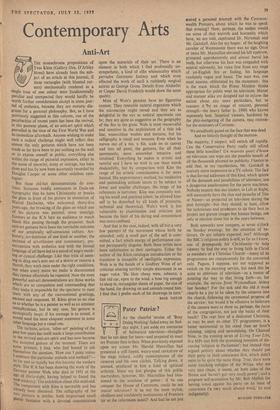Pater Patriae?
As the cheerful 'strains of 'Busy Doing Nothing' faded away on Sud-
ri day night, I put aside my memories V of Sabbatical television—thoughts that lie too deep for tears—and prepared to meet my Premier face to face. When previously exposed upon my screen Mr. Harold Macmillan had presented a stiff-lipped, weary-eyed caricature of the stage milord, coldly contemptuous of the cameras and his own clichés. Talking down, it seemed, produced in him a kind of spiritual arthritis. Since my last glimpse of this public martyrdom, however, Mr. Macmillan had blos- somed in the sunshine of power : if he can conquer the House of Commons, could he not master television? Is he not the most stylish, ebullient and confidently bonhomous of Premiers (or so the columnists insist)? And had he not just scored a personal triumph with the Common- wealth Premiers, about which he was to speak that evening? Now, perhaps, the nation would see some of that warmth and humanity which have, we are told, captivated Dr. Nkrumah and Mr. Gaitskell. Alas for my hopes : of the laughing cavalier of Westminster there was no sign. Once or twice Mr. Macmillan elevated his left eyebrow, grimaced apprehensively and almost bared his teeth, but otherwise his face was congealed with neutral solemnity, his voice free from any tinge of un-English fire or feeling, his language resolutely vague and banal. The man was, one must assume, obliterated by the statesman: this is the mask which the Prime Minister thinks appropriate for public wear on television. Matter and manner alike are designed not to inform the nation about any mere particulars, but to reassure it by an image of reticent, parental strength—the heavy father (c. 1900) who knows supremely best. Sceptical viewers, hardened by the phiz-mongering of the camera, may remem- ber the mourners of Corunna :
We steadfastly gazed on the face that was dead And we bitterly thought of the morrow.
The majority, I suspect, will switch off rapidly. Can the Conservative Party really still afford these little homilies? Un mauvais quart d'heure on television can wipe out the possible benefit of all the thousands planned on publicity. I hasten to add that, in my recollection, Mr. Gaitskell is scarcely more impressive as a TV soloist. The fact is that formal addresses of this kind, which ignore all the demands and possibilities of television, are a dangerous anachronism for the party machines. Nobody expects that our leaders, to Left or Right, will necessarily have the elan and panache of Tito or Nasser—as projected on television during the past fortnight—but they should, at least, allow the technicians and producers to do their best to project not graven images but, human beings, not only at election times but in the years between.
Both networks now compete, at seven o'clock on Sunday evenings, for the attention of be- lievers. Or are infidels expected, too? Although the BBC's religious policy is still, as far as I know, one of propaganda for Christianity—to help viewers 'to find the way to living faith in Christ as members of a Christian Church'—many of its programmes are conspicuously for the converted only. Pagans, I suppose, are not supposed „to switch on the morning service, but need this be quite so oblivious of television—as a means of pointing the way to that living faith—as, for example, the service from Wymondham Abbey last Sunday? For the sick and the old it must clearly be a joy to be taken by the cameras into the church, following the ceremonial progress of the service: but would it be offensive to believers, if the camera were to show us, perhaps, the faces of the congregation, not just the backs of their heads? The rapt face of a dedicated Christian, as may be seen on other TV programmes, is a better testimonial to his creed than an hour's intoning, singing and sermonising. On Channel Nine, in the evening series of Living Your Life, five MPs met With the promising intention of dis- cussing 'religion in Parliament'; but instead they argued politely about whether they should put their party or their conscience first, which didn't seem to be quite the same thing. True, there were some touching eulogies of the Whips, who are very nice chaps, it seems, on both sides of the House and 'haven't got very much power'; and a poignant self-accusation by Mr. Bob Mellish for having voted against his party on an issue of conscience ('a very much abused word,' he said indignantly).
RICHARD FINDLATER














































 Previous page
Previous page